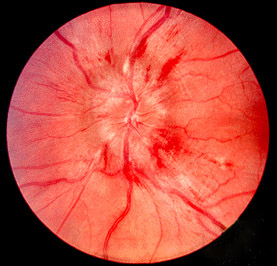Papilledema

Editor-In-Chief: Prab R Tumpati, MD
Obesity, Sleep & Internal medicine
Founder, WikiMD Wellnesspedia &
W8MD's medical weight loss NYC, sleep center NYC
Philadelphia medical weight loss and Philadelphia sleep clinics
| Papilledema | |
|---|---|
 | |
| Synonyms | Papilloedema |
| Pronounce | N/A |
| Specialty | N/A |
| Symptoms | Headache, nausea, vomiting, visual disturbances |
| Complications | Vision loss, blindness |
| Onset | Sudden or gradual |
| Duration | Variable, depending on underlying cause |
| Types | N/A |
| Causes | Increased intracranial pressure, brain tumor, cerebral hemorrhage, meningitis, pseudotumor cerebri |
| Risks | Obesity, hypertension, pregnancy |
| Diagnosis | Fundoscopy, MRI, CT scan, lumbar puncture |
| Differential diagnosis | Optic neuritis, ischemic optic neuropathy, glaucoma |
| Prevention | N/A |
| Treatment | Addressing underlying cause, medications, surgery |
| Medication | N/A |
| Prognosis | Depends on cause and treatment |
| Frequency | Varies |
| Deaths | N/A |


Papilledema is a medical condition where the optic disc (the area at the back of the eye where the optic nerve enters) swells due to increased intracranial pressure. This condition can be a sign of serious medical conditions such as brain tumors or meningitis.
Causes[edit]
Papilledema is caused by an increase in intracranial pressure due to various conditions such as brain tumors, meningitis, hypertensive emergency, or idiopathic intracranial hypertension.
Symptoms[edit]
The symptoms of papilledema can vary depending on the cause of the increased intracranial pressure. Some common symptoms include headache, nausea, vomiting, blurred vision, and diplopia (double vision). In severe cases, it can lead to vision loss.
Diagnosis[edit]
The diagnosis of papilledema is usually made by an ophthalmologist using an ophthalmoscope to examine the back of the eye. Other tests such as MRI or CT scan may be used to determine the cause of the increased intracranial pressure.
Treatment[edit]
The treatment of papilledema is aimed at reducing the increased intracranial pressure. This can be achieved through medication, surgery, or other treatments depending on the cause of the increased pressure.
See also[edit]
Ad. Transform your life with W8MD's Budget GLP-1 injections from $75


W8MD offers a medical weight loss program to lose weight in Philadelphia. Our physician-supervised medical weight loss provides:
- Weight loss injections in NYC (generic and brand names):
- Zepbound / Mounjaro, Wegovy / Ozempic, Saxenda
- Most insurances accepted or discounted self-pay rates. We will obtain insurance prior authorizations if needed.
- Generic GLP1 weight loss injections from $75 for the starting dose.
- Also offer prescription weight loss medications including Phentermine, Qsymia, Diethylpropion, Contrave etc.
NYC weight loss doctor appointmentsNYC weight loss doctor appointments
Start your NYC weight loss journey today at our NYC medical weight loss and Philadelphia medical weight loss clinics.
- Call 718-946-5500 to lose weight in NYC or for medical weight loss in Philadelphia 215-676-2334.
- Tags:NYC medical weight loss, Philadelphia lose weight Zepbound NYC, Budget GLP1 weight loss injections, Wegovy Philadelphia, Wegovy NYC, Philadelphia medical weight loss, Brookly weight loss and Wegovy NYC
|
WikiMD's Wellness Encyclopedia |
| Let Food Be Thy Medicine Medicine Thy Food - Hippocrates |
Medical Disclaimer: WikiMD is not a substitute for professional medical advice. The information on WikiMD is provided as an information resource only, may be incorrect, outdated or misleading, and is not to be used or relied on for any diagnostic or treatment purposes. Please consult your health care provider before making any healthcare decisions or for guidance about a specific medical condition. WikiMD expressly disclaims responsibility, and shall have no liability, for any damages, loss, injury, or liability whatsoever suffered as a result of your reliance on the information contained in this site. By visiting this site you agree to the foregoing terms and conditions, which may from time to time be changed or supplemented by WikiMD. If you do not agree to the foregoing terms and conditions, you should not enter or use this site. See full disclaimer.
Credits:Most images are courtesy of Wikimedia commons, and templates, categories Wikipedia, licensed under CC BY SA or similar.
Translate this page: - East Asian
中文,
日本,
한국어,
South Asian
हिन्दी,
தமிழ்,
తెలుగు,
Urdu,
ಕನ್ನಡ,
Southeast Asian
Indonesian,
Vietnamese,
Thai,
မြန်မာဘာသာ,
বাংলা
European
español,
Deutsch,
français,
Greek,
português do Brasil,
polski,
română,
русский,
Nederlands,
norsk,
svenska,
suomi,
Italian
Middle Eastern & African
عربى,
Turkish,
Persian,
Hebrew,
Afrikaans,
isiZulu,
Kiswahili,
Other
Bulgarian,
Hungarian,
Czech,
Swedish,
മലയാളം,
मराठी,
ਪੰਜਾਬੀ,
ગુજરાતી,
Portuguese,
Ukrainian


